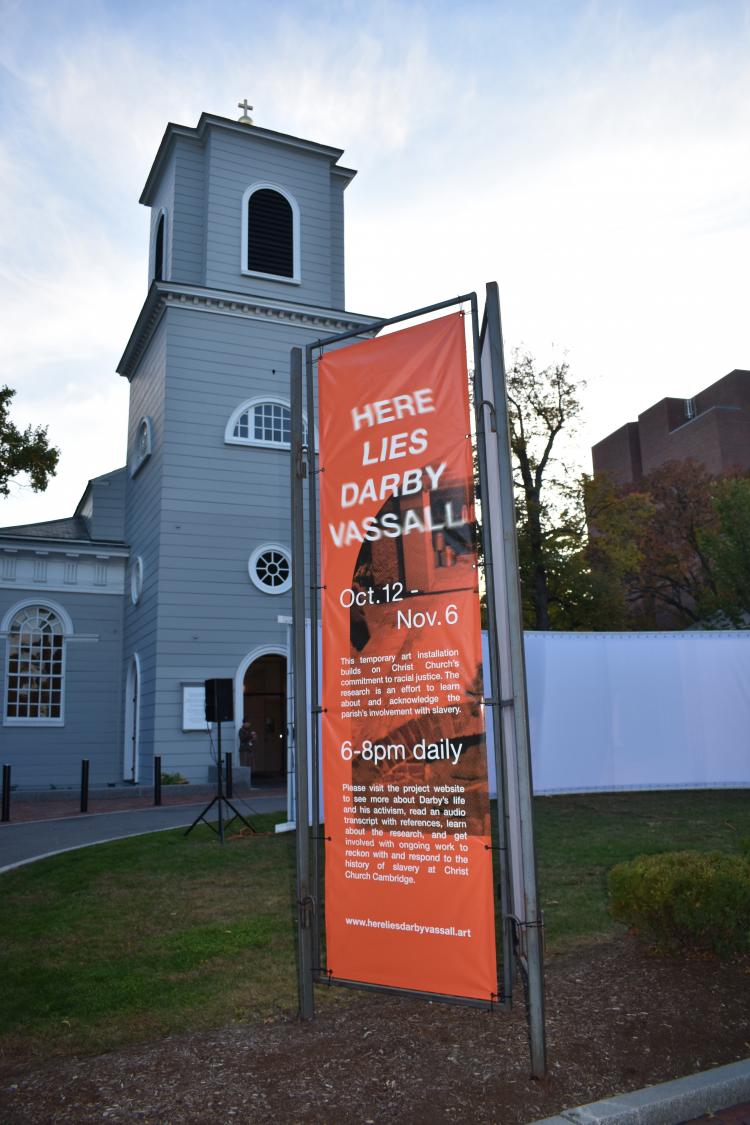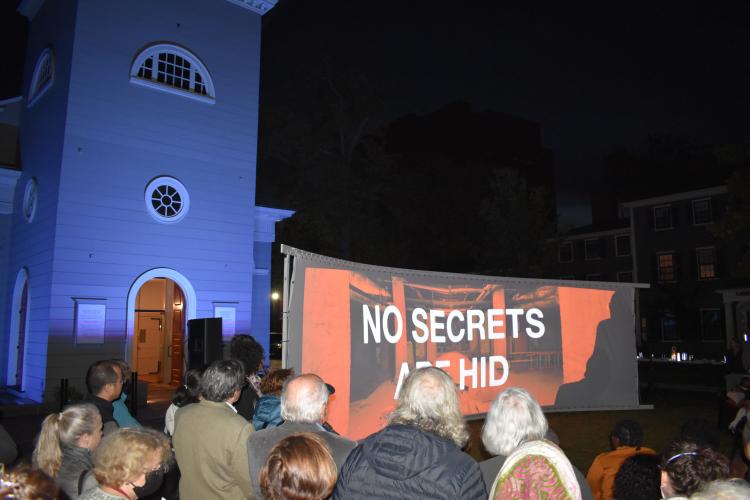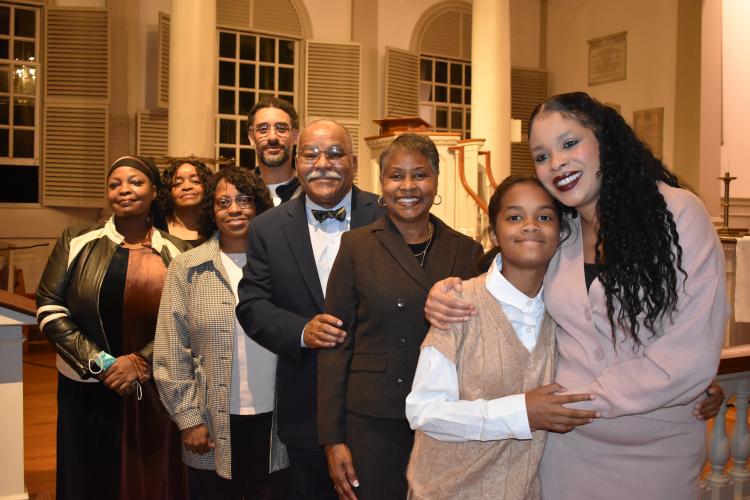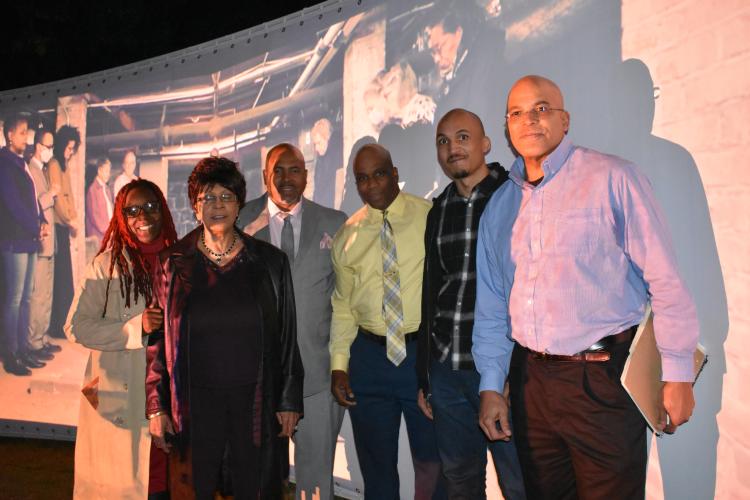As evening darkness fell over Harvard Square in Cambridge on Oct. 12, a big screen erected on the front lawn of Christ Church lit up with a message for all to see:
"Here Lies Darby Vassall."
With two families of Darby Vassall descendants watching from front-row folding chairs amid a standing crowd of parishioners, guests and curious passers-by, the 11-minute film had its outdoor debut on the anniversary of Vassall's death, in 1861. As part of a multimedia installation created by researcher and artist Nicole Piepenbrink, it is putting a public spotlight on some historical facts that many at the iconic 1759 church became aware of only recently.
Darby Vassall, son of Tony and Cuba, was born in 1769 into enslavement by the Vassall family, early benefactors of Christ Church. After slavery was made unlawful in Massachusetts in 1783, he went on to become a leader in Boston's Black community, helping to found a mutual aid society for Black Bostonians, petitioning for state funding for Black children's schooling and advocating all his life for equal rights and abolition of slavery. No one knows why, but it was Darby Vassall's choice to be buried in the Vassall family tomb under Christ Church's sanctuary.
None of the four published histories about Christ Church mention the origins of money used to fund the church's construction, maintenance and growth, even as the slave trade and its related enterprises continued to enrich church benefactors into the 19th century.
Piepenbrink started her "Here Lies Darby Vassall" thesis project two years ago at Harvard's Graduate School of Design with "an interest in looking at how spatial conditions of church buildings with historic designations tell selective stories about the past. Stories that continue to shape our psyches, influence our actions and perpetuate injustices in the present," she said during a church ceremony at the film installation's launch.
"Analyzing the spatial conditions of Christ Church revealed that the only physical marker on this site that nods to the history of slavery can be found on a framed sheet of paper positioned at the back of the Vassall tomb in the basement. One-and-a-half lines state that Darby Vassall, son of Tony Vassall, is buried in the tomb."
Christ Church's rector, the Rev. Kate Ekrem, said the film project is a first step in the parish's efforts to acknowledge and reckon with its "entanglement in the legacy of slavery."
"We have learned that history is not just a set of facts but the way you tell the story, and that we've been telling the story wrong," Ekrem told the gathering. "We've been accepting stories that we should have been questioning, and we've been forgetting stories we should have remembered."
The blessing of doing this work as a church, she said, is that "Jesus shows us how to move forward in forgiveness and reconciliation into resurrection and liberation. But forgiveness and reconciliation start with repentance, start with telling the whole story, and that's what we begin to do today."
"Here Lies Darby Vassall" will play for the public on Christ Church's outdoor screen, on a loop, daily from 6 to 8 p.m. through All Saints Sunday, Nov. 6. It is also available for viewing on the project website, hereliesdarbyvassall.art.
One of Darby Vassall's living descendants is Dennis Lloyd, a Roxbury native who is retired and now lives in Atlanta and serves on the vestry at St. Paul's Church there. During a group interview in August via Zoom that included his daughter Egypt, Nicole Piepenbrink and leaders of Christ Church's Racial Justice Group, Lloyd recalled first visiting Christ Church in the 1960s for the wedding of the late Rev. Neal Hastie, whom he knew through Hastie's youth organizing efforts in Roxbury.
"I remember sitting in the back," Lloyd recalled. "I would never have realized that years later there would be a connection made to my family being at Christ Church, that my great great grandfather, a slave descendant, was buried there. So that was a revelation."
Ted Hammett, a co-facilitator of the Christ Church Racial Justice Group, described what a revelation it was for the parish, too, when Alden Fosset, Kellogg Fellow at the Episcopal Chaplaincy at Harvard, preached a sermon late last year about Darby Vassall.
"I've been a member of Christ Church since 1986 and that was the first I knew that there was a formerly enslaved person buried under our church. I think that was true for many of our parishioners. That was for many of us a really amazing and jarring discovery," Hammett said.
David Brancazio, who also co-facilitates the Racial Justice Group, added that, for him, awareness of slavery's local legacy has been a slow dawning. "I'm embarrassed to say this, but I had no idea that slavery was even being enforced in New England, and through this project I've learned that not only was slavery alive and well but the slave trade and money from it was a primary source of wealth in New England. That was just sort of stunning to me. I hope that this project helps educate the Boston public about our true history. It's not something that I think is out there and in the front of people's minds."
When Piepenbrink, who was looking for a church site for her thesis project, fortuitously contacted Christ Church out of the blue, Hammett said, it had a galvanizing effect.
"Christ Church has already committed itself to trying to ensure that this installation isn't just a sort of one-off event," Hammett said. "The vestry and the Racial Justice Group, working with Nicole, have tried to stress that there needs to be reparative action that flows from this, and the vestry, in its decision to go forward with the project, also voted to create a parish committee to study and recommend reparative actions that we could take. We don't know what those are going to be yet but certainly I think there is a commitment that that is going to happen. We need to work hard to ensure that it does and that it does in a way that's proportional to not only the wrong that happened here but also the goodness and greatness of Darby Vassall himself that needs to be memorialized."
The "Here Lies Darby Vassall" project, Dennis Lloyd said, "brings to light that here lies not just a formerly enslaved person whose descendants are still around, but here lies a man by the name of Darby Vassall, a person who despite what he had gone through went forward to help improve the lives of African Americans, of Black folks, in the Boston community. 'Here Lies Darby Vassall' speaks not only to the connection to Christ Church but also to the connection that Darby Vassall and his existence has had to the greater Boston community, certainly, because we are speaking of him right now 250 years later."
Last year, Lloyd and his family founded the Slave Legacy History Coalition to help families descended from enslaved people, and others, connect with repositories of slave legacy history in Boston and Cambridge.
It, along with projects like "Here Lies Darby Vassall," he said, "bring into present form the commitment that people have to elevate and not lose that history because it's so important.
"I want to do that. I want my children to do that. I want my grandchildren to do that," Lloyd said. "I'm a product of the 60s coming up, and nothing was promised at that time. And then there were people that committed to civil rights and doors opened up. I'm the recipient of something, from Darby Vassall on down. It's a heck of a thing to follow," Lloyd said.
"Darby may not be here with us physically but he's definitely here with us spiritually," Lloyd's daughter Egypt added. "It's a gift, to see what my father's accomplished and to understand where I'm getting my strength from. This brings a light to that. I'm just thankful for all of this outcome."
Piepenbrink said that the "Here Lies Darby Vassall" project has been, for her, personally transformational.
"I am not the same person on this side of the research as I was before ever beginning. I don't think there is a way you could be. These are humans. These are souls. These are their stories. These are people's lives," she said.
"When I first started looking through archives, specifically primary source archival documents related to Christ Church, my question was, OK, who was enslaving or participating in the slave trade or benefiting from it? I'm going to find those people, starting with names like Benjamin Faneuil, the brother of Peter Faneuil, who was a parishioner at Christ Church and had a pew.
"As I continued moving through the archives, at first my jaw was just constantly dropping with how many names there were. My question totally changed from who was to who wasn't. The exceptions were not the folks profiting from participating; the exceptions were the ones who weren't. Obviously that's intellectual learning from looking at archives, but that's also an emotional kind of learning and spiritual learning, because it really changes how I and so many others were taught history, the way we understand our present reality that is framed by that teaching of history. It's a huge shift."
Where is Jesus in all this?
"I guess the question for me is, where is Jesus not in this?" Piepenbrink said. "I'm so compelled by the life of Jesus and his example towards exactly this kind of thing. I was just reflecting earlier on Isaiah 61, and I believe in things like liberty for the captives, the oil of gladness for those who mourn, the restoration of ruins. This is God's heart, you know?"
Ted Hammett credited Christ Church's recent interim rector, the Rev. Kate Elledge, as well its current rector, the Rev. Kate Ekrem, with bringing "to the fore in a way which is really clear and compelling that if we are to be followers of Jesus, there is an imperative that we work for justice and there is no question about that. We will fail. We will fail many times and in many ways, but we have to try. Being Christian is about a lot of things, but more than anything else it's about following the imperative of Jesus to do justice."
During an interview at the church in July, Ekrem acknowledged that reckoning with racial injustice is hard work, and that a discussion forum after church on a recent Sunday had been helpful and important for her congregation. "It's going to stir up uncomfortable feelings and we have to be able to face that," she said.
"In my own journey towards trying to become a more antiracist person, as incomplete as that journey is, I really have taken on board that we have to feel the feelings, and if we don't sit with the emotions that all of this history stirs up in us, we won't be able to turn to God for grace and forgiveness and reconciliation," she said.
Her advice to other congregations wanting to begin a similar journey is to find a place to start, and then just start.
"There's no perfect way to do it. I just feel like we can't get paralyzed by our fear that we're not going to do it the correct way or that we're going to get criticized," Ekrem said.
In addition to diocesan resources that are available, she said, "I would really encourage parishes to connect with other parishes already doing this work. And then, for us, also reaching out to our neighbor churches in our local community who share this history has been helpful. You're not in this alone."
Christ Church is partnering with nearby First Church, Congregational and First Parish, Unitarian Universalist, as well as the Episcopal Chaplaincy at Harvard, for neighborhood walking tours and a Nov. 5 retreat day focused on learning and reflecting together about the legacy of slavery.
"We're definitely learning that it's a path, and you come in at different places and have to move through certain parts of it at the right rate. We're still learning about that. There are a lot of steps we haven't taken yet," David Brancazio of Christ Church's Racial Justice Group said. As a result of the "Here Lies Darby Vassall" project, he said, "There may be some challenging things that happen down the road, and so I just hope it moves us in the direction we need to go towards truth and coming to grips with it and making the world a better place for everyone, but especially for people of color."
"The truth will set you free," Dennis Lloyd said in response, "and the truth is, we're talking about it now, we're all here. We can't right every wrong, but what we can do is move forward together collectively."
--Tracy J. Sukraw




